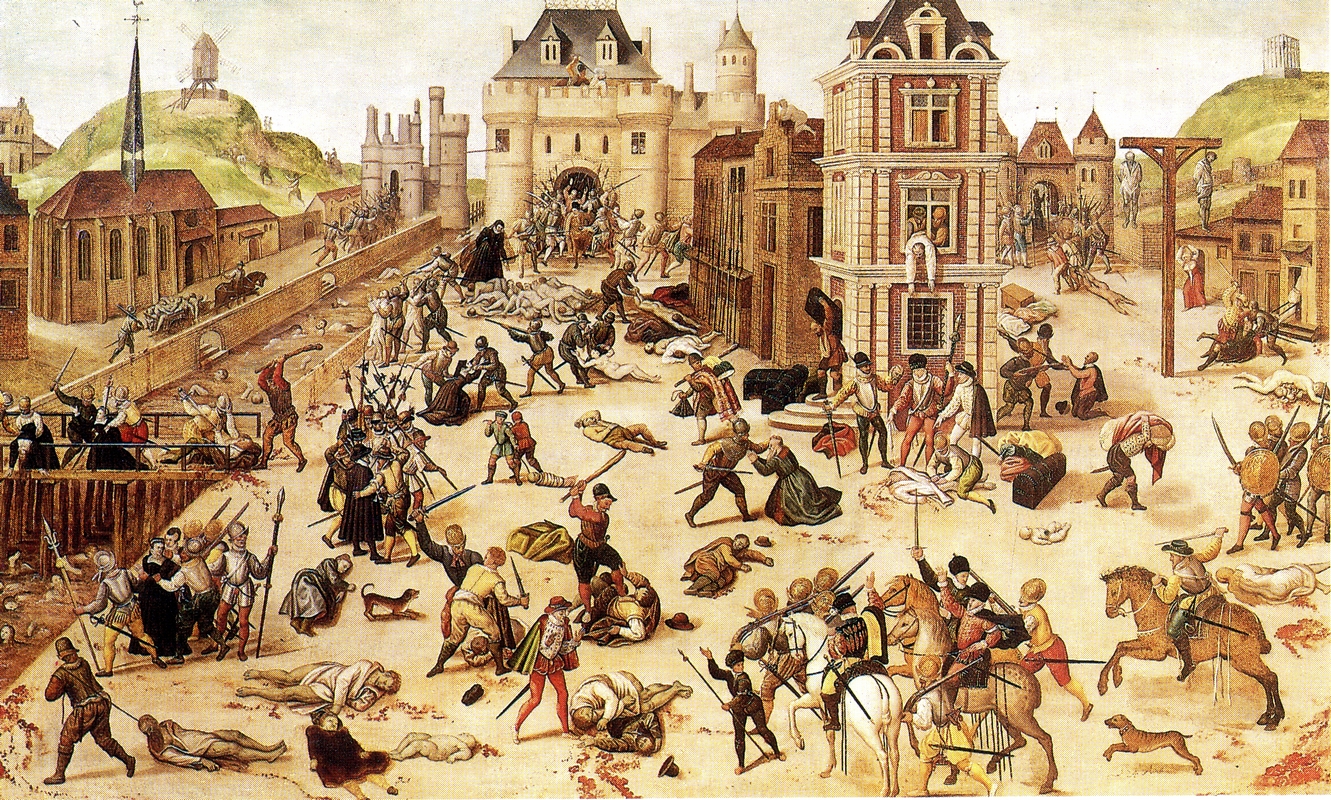It happened today - August 24, 2015
 They say it’s an ill wind that blows nobody any good. Which I certainly understand when it comes to the treacherous St. Bartholomew’s Day massacre in France on August 24, 1572. It was a catastrophe for French Protestants, of course. But it was also very bad for France, both a sign and a cause of its underlying Constitutional weakness. So I think it would be more than a little self-absorbed to present as a significant offsetting consideration that it drove some of my Huguenot ancestors to England where the vagaries of love and life ultimately led to my being born instead of not.
They say it’s an ill wind that blows nobody any good. Which I certainly understand when it comes to the treacherous St. Bartholomew’s Day massacre in France on August 24, 1572. It was a catastrophe for French Protestants, of course. But it was also very bad for France, both a sign and a cause of its underlying Constitutional weakness. So I think it would be more than a little self-absorbed to present as a significant offsetting consideration that it drove some of my Huguenot ancestors to England where the vagaries of love and life ultimately led to my being born instead of not.
Indeed, whenever you trace back all the incidents, improbable and otherwise, the sequence not merely of meetings but the specific fertilization of precisely this egg by exactly that sperm since the dawn of reproduction that is necessary for any of us to be hanging around annoying people, it is clear that none of us could ever possibly be born anyway. So let me focus instead on the big picture rather than the young Huguenot who I imagine escaping by the skin of his chattering teeth under a fisherman’s tarpaulin to England where he established a long and proud tradition of expiring penniless in Charing Cross Poorhouse to which I owe a fair slice of my maternal ancestry.
In case you don’t follow catastrophically devious treachery at the highest levels in France, finding the occupation too time-consuming, the Reformation and Counter-Reformation had seen the emergence of a politically as well as demographically significant Protestant, largely Calvinist, population in France by the mid-16th century, perhaps 2 of 16 million, known by the originally derisive epithet Huguenots. And in 1572 the weak King Charles IX was persuaded by his mother Catherine de Medici (boy, there’s a sentence that’s just never going to end well) that the Huguenots were planning rebellion and that despite the Edict of St. Germain promising them toleration, that Catherine herself had promulgated as regent back in 1562, he should slaughter them disgracefully.
Thus inspired, he arranged the wedding of his sister to the Protestant Henry of Navarre, invited a glittering roster of Protestant guests to Paris and had them butchered in an orgy of bloodshed that began with assassination and ended with mob lynchings.
Now it “worked” in the sense of crippling the Huguenot movement by decapitating it and leading many moderates to convert back to Catholicism and many others to become more radical. In the “War of the Three Henris” that followed the massacre, Henri III was assassinated by a Catholic fanatic, the House of Valois fizzled ignominiously out, and the victor, Henry of Navarre, converted to Catholicism to become the first Bourbon monarch, uttering the memorable quip “Paris is well worth a Mass.”
I suppose it depends how you define “worth”. He did rule for 21 years and is much admired but was assassinated by a Catholic fanatic. And his Edict of Nantes issued in 1598 entrenching toleration for Protestants was revoked by Louis XIV in 1685.
Behind all this jiggery-pokery was a deep and unsettling problem. France had neither the mechanisms nor the cultural foundation to extend genuine liberty under law. Instead Protestants hid or fled, often bringing valuable skills and talents to their new homelands including Britain’s colonies while the loss of these people sapped France’s economic, cultural and even military vitality.
The French inability to provide solid limited government, and their achievement of only a half-open society, would ultimately doom the Bourbons as well in the French Revolution, another outburst of bloodshed and chaos that brought far too much slaughter, destruction and upheaval and far too little genuine reconciliation and tolerance.
Despite many difficulties along the way, I think my Huguenot ancestors gained considerably by leaving France. But it was France’s loss that they had to go.